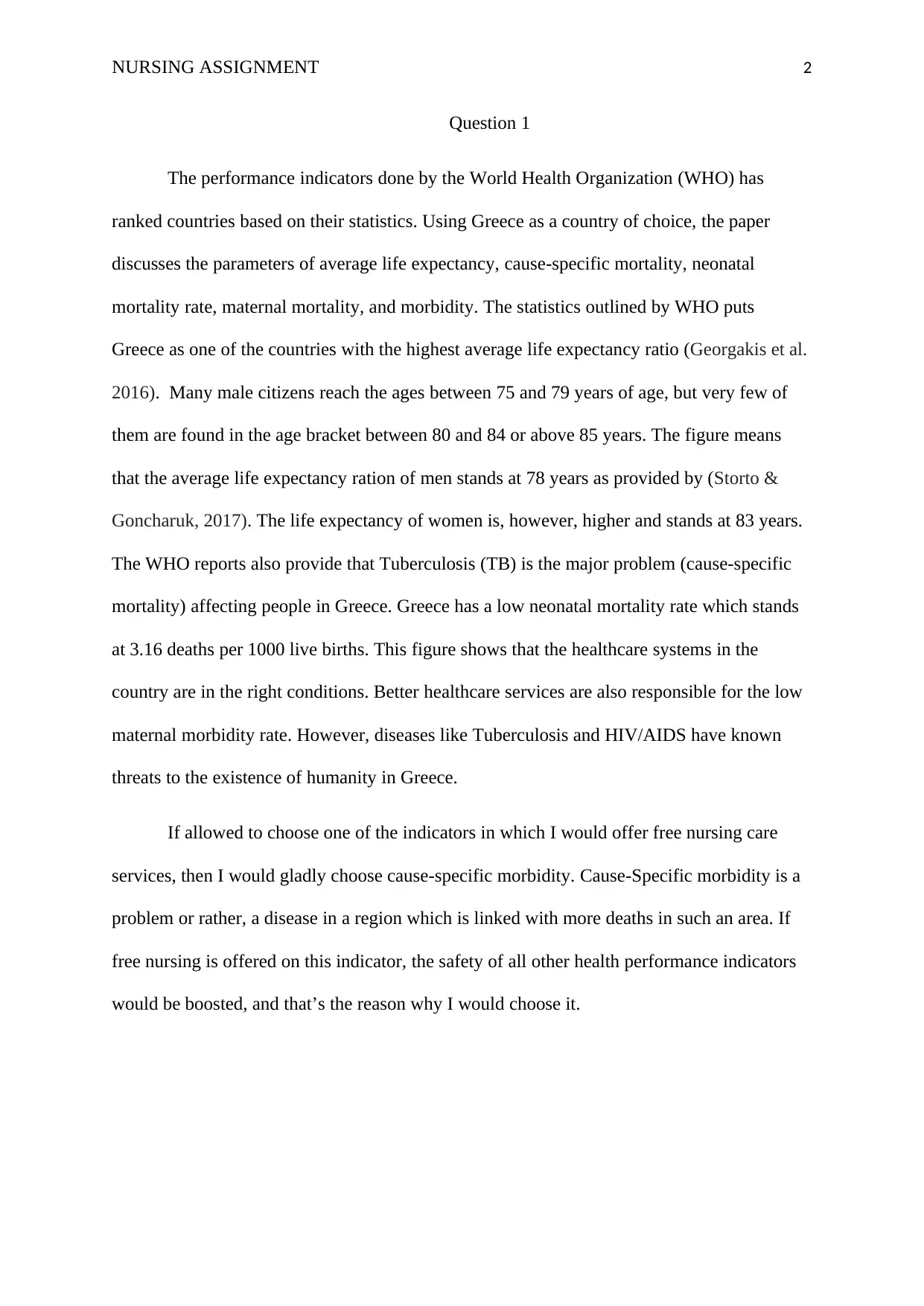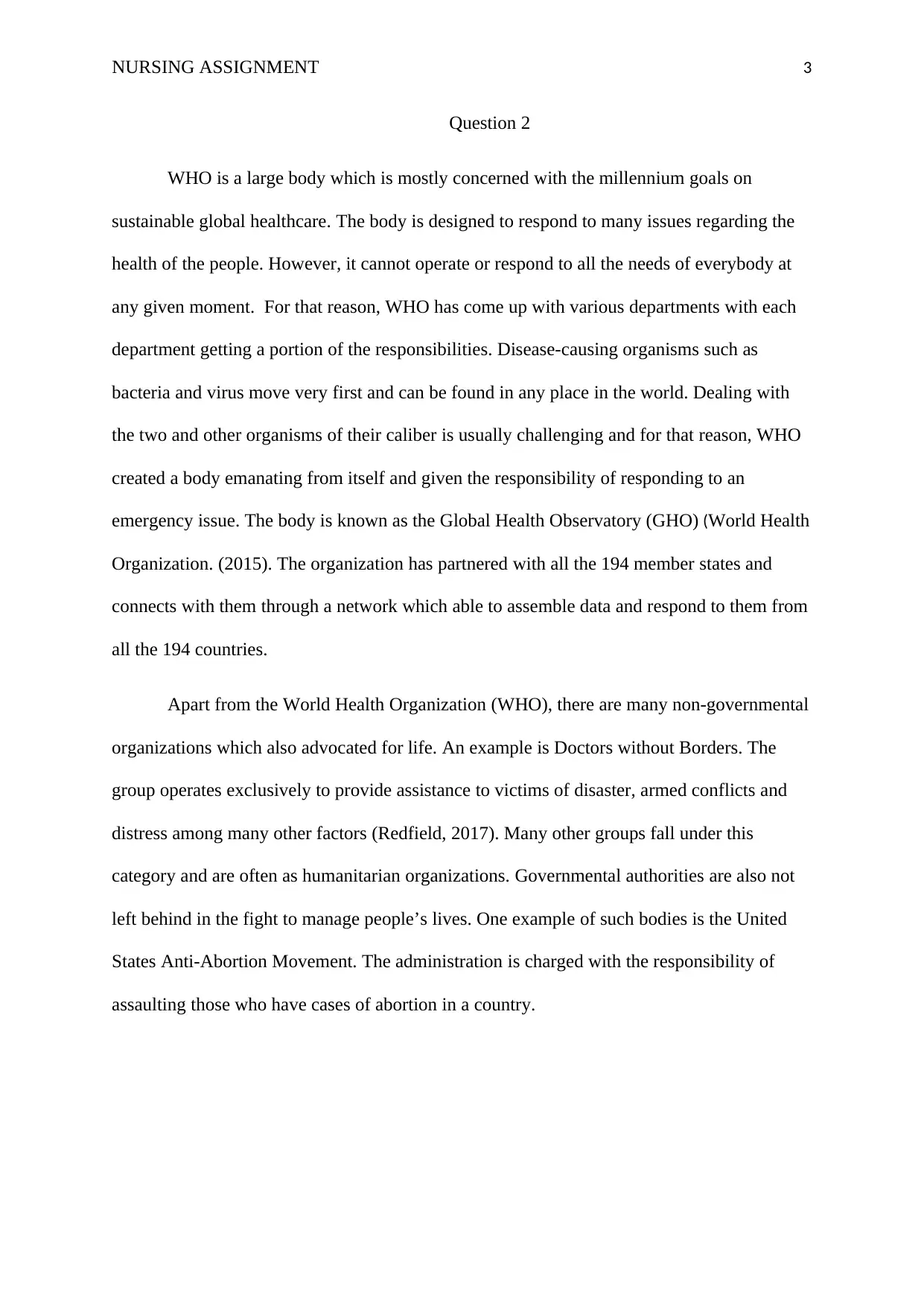Healthcare Report: Analysis of Nursing Assignment on Greece
VerifiedAdded on 2023/03/20
|4
|833
|96
Report
AI Summary
This nursing assignment analyzes the healthcare system in Greece, focusing on performance indicators like average life expectancy, cause-specific mortality, neonatal mortality, maternal mortality, and morbidity. The report highlights Greece's high life expectancy, particularly for women, while also identifying Tuberculosis as a major cause-specific mortality issue. The assignment discusses the role of the World Health Organization (WHO) and its Global Health Observatory (GHO) in addressing global health concerns, along with the contributions of non-governmental organizations like Doctors Without Borders. It also touches upon governmental influences on healthcare, using the United States Anti-Abortion Movement as an example. The author identifies cause-specific morbidity as a critical area for nursing intervention.

Running head: NURSING ASSIGNMENT 1
Healthcare: Nursing Assignment
Student’s Name
Institutional Affiliation
Healthcare: Nursing Assignment
Student’s Name
Institutional Affiliation
Paraphrase This Document
Need a fresh take? Get an instant paraphrase of this document with our AI Paraphraser

NURSING ASSIGNMENT 2
Question 1
The performance indicators done by the World Health Organization (WHO) has
ranked countries based on their statistics. Using Greece as a country of choice, the paper
discusses the parameters of average life expectancy, cause-specific mortality, neonatal
mortality rate, maternal mortality, and morbidity. The statistics outlined by WHO puts
Greece as one of the countries with the highest average life expectancy ratio (Georgakis et al.
2016). Many male citizens reach the ages between 75 and 79 years of age, but very few of
them are found in the age bracket between 80 and 84 or above 85 years. The figure means
that the average life expectancy ration of men stands at 78 years as provided by (Storto &
Goncharuk, 2017). The life expectancy of women is, however, higher and stands at 83 years.
The WHO reports also provide that Tuberculosis (TB) is the major problem (cause-specific
mortality) affecting people in Greece. Greece has a low neonatal mortality rate which stands
at 3.16 deaths per 1000 live births. This figure shows that the healthcare systems in the
country are in the right conditions. Better healthcare services are also responsible for the low
maternal morbidity rate. However, diseases like Tuberculosis and HIV/AIDS have known
threats to the existence of humanity in Greece.
If allowed to choose one of the indicators in which I would offer free nursing care
services, then I would gladly choose cause-specific morbidity. Cause-Specific morbidity is a
problem or rather, a disease in a region which is linked with more deaths in such an area. If
free nursing is offered on this indicator, the safety of all other health performance indicators
would be boosted, and that’s the reason why I would choose it.
Question 1
The performance indicators done by the World Health Organization (WHO) has
ranked countries based on their statistics. Using Greece as a country of choice, the paper
discusses the parameters of average life expectancy, cause-specific mortality, neonatal
mortality rate, maternal mortality, and morbidity. The statistics outlined by WHO puts
Greece as one of the countries with the highest average life expectancy ratio (Georgakis et al.
2016). Many male citizens reach the ages between 75 and 79 years of age, but very few of
them are found in the age bracket between 80 and 84 or above 85 years. The figure means
that the average life expectancy ration of men stands at 78 years as provided by (Storto &
Goncharuk, 2017). The life expectancy of women is, however, higher and stands at 83 years.
The WHO reports also provide that Tuberculosis (TB) is the major problem (cause-specific
mortality) affecting people in Greece. Greece has a low neonatal mortality rate which stands
at 3.16 deaths per 1000 live births. This figure shows that the healthcare systems in the
country are in the right conditions. Better healthcare services are also responsible for the low
maternal morbidity rate. However, diseases like Tuberculosis and HIV/AIDS have known
threats to the existence of humanity in Greece.
If allowed to choose one of the indicators in which I would offer free nursing care
services, then I would gladly choose cause-specific morbidity. Cause-Specific morbidity is a
problem or rather, a disease in a region which is linked with more deaths in such an area. If
free nursing is offered on this indicator, the safety of all other health performance indicators
would be boosted, and that’s the reason why I would choose it.

NURSING ASSIGNMENT 3
Question 2
WHO is a large body which is mostly concerned with the millennium goals on
sustainable global healthcare. The body is designed to respond to many issues regarding the
health of the people. However, it cannot operate or respond to all the needs of everybody at
any given moment. For that reason, WHO has come up with various departments with each
department getting a portion of the responsibilities. Disease-causing organisms such as
bacteria and virus move very first and can be found in any place in the world. Dealing with
the two and other organisms of their caliber is usually challenging and for that reason, WHO
created a body emanating from itself and given the responsibility of responding to an
emergency issue. The body is known as the Global Health Observatory (GHO) (World Health
Organization. (2015). The organization has partnered with all the 194 member states and
connects with them through a network which able to assemble data and respond to them from
all the 194 countries.
Apart from the World Health Organization (WHO), there are many non-governmental
organizations which also advocated for life. An example is Doctors without Borders. The
group operates exclusively to provide assistance to victims of disaster, armed conflicts and
distress among many other factors (Redfield, 2017). Many other groups fall under this
category and are often as humanitarian organizations. Governmental authorities are also not
left behind in the fight to manage people’s lives. One example of such bodies is the United
States Anti-Abortion Movement. The administration is charged with the responsibility of
assaulting those who have cases of abortion in a country.
Question 2
WHO is a large body which is mostly concerned with the millennium goals on
sustainable global healthcare. The body is designed to respond to many issues regarding the
health of the people. However, it cannot operate or respond to all the needs of everybody at
any given moment. For that reason, WHO has come up with various departments with each
department getting a portion of the responsibilities. Disease-causing organisms such as
bacteria and virus move very first and can be found in any place in the world. Dealing with
the two and other organisms of their caliber is usually challenging and for that reason, WHO
created a body emanating from itself and given the responsibility of responding to an
emergency issue. The body is known as the Global Health Observatory (GHO) (World Health
Organization. (2015). The organization has partnered with all the 194 member states and
connects with them through a network which able to assemble data and respond to them from
all the 194 countries.
Apart from the World Health Organization (WHO), there are many non-governmental
organizations which also advocated for life. An example is Doctors without Borders. The
group operates exclusively to provide assistance to victims of disaster, armed conflicts and
distress among many other factors (Redfield, 2017). Many other groups fall under this
category and are often as humanitarian organizations. Governmental authorities are also not
left behind in the fight to manage people’s lives. One example of such bodies is the United
States Anti-Abortion Movement. The administration is charged with the responsibility of
assaulting those who have cases of abortion in a country.
⊘ This is a preview!⊘
Do you want full access?
Subscribe today to unlock all pages.

Trusted by 1+ million students worldwide

NURSING ASSIGNMENT 4
References
Georgakis, M. K., Papadopoulos, F. C., Protogerou, A. D., Pagonari, I., Sarigianni, F.,
Biniaris-Georgallis, S. I. ... & Papageorgiou, S. G. (2016). Comorbidity of cognitive
impairment and late-life depression increase mortality: results from a cohort of
community-dwelling elderly individuals in rural Greece. Journal of geriatric
psychiatry and neurology, 29(4), 195-204. https://doi.org/10.1177/0891988716632913
Redfield, P. (2017). Doctors without borders and the moral economy of pharmaceuticals. In
Human Rights in Crisis (pp. 129-144). Routledge.
Storto, C. L., & Goncharuk, A. G. (2017). Performance measurement of healthcare systems
in Europe. Journal of Applied Management and Investments, 6(3), 170-174.
World Health Organization. (2015). Investing to overcome the global impact of neglected
tropical diseases: third WHO report on neglected tropical diseases 2015 (Vol. 3).
World Health Organization.
References
Georgakis, M. K., Papadopoulos, F. C., Protogerou, A. D., Pagonari, I., Sarigianni, F.,
Biniaris-Georgallis, S. I. ... & Papageorgiou, S. G. (2016). Comorbidity of cognitive
impairment and late-life depression increase mortality: results from a cohort of
community-dwelling elderly individuals in rural Greece. Journal of geriatric
psychiatry and neurology, 29(4), 195-204. https://doi.org/10.1177/0891988716632913
Redfield, P. (2017). Doctors without borders and the moral economy of pharmaceuticals. In
Human Rights in Crisis (pp. 129-144). Routledge.
Storto, C. L., & Goncharuk, A. G. (2017). Performance measurement of healthcare systems
in Europe. Journal of Applied Management and Investments, 6(3), 170-174.
World Health Organization. (2015). Investing to overcome the global impact of neglected
tropical diseases: third WHO report on neglected tropical diseases 2015 (Vol. 3).
World Health Organization.
1 out of 4
Related Documents
Your All-in-One AI-Powered Toolkit for Academic Success.
+13062052269
info@desklib.com
Available 24*7 on WhatsApp / Email
![[object Object]](/_next/static/media/star-bottom.7253800d.svg)
Unlock your academic potential
Copyright © 2020–2026 A2Z Services. All Rights Reserved. Developed and managed by ZUCOL.





